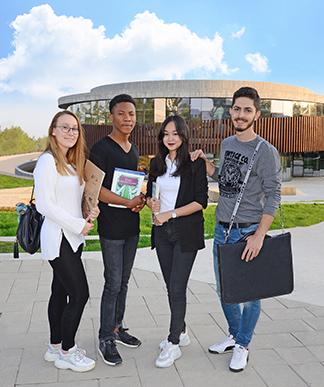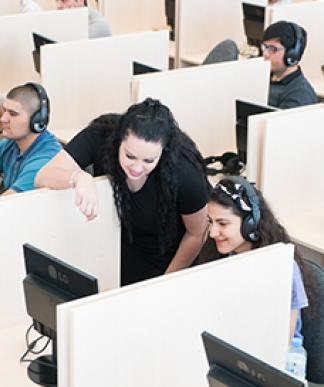


About the Program
The demand for English teachers is stronger than ever as English dominates the fields of education, technology, science, business, medicine, and travel. To this end, the English Language Teaching program raises its graduates as qualified teachers, allowing them to teach at all levels of education from primary and secondary to higher education and the professional world beyond. Delivering both theoretical and practical education in a student-centered environment, the CIU FLE curriculum incorporates a holistic approach, developing learners in not only English and state-of-the-art language teaching strategies, but also culture, problem-solving, digital literacy and other 21st century skills.
Accreditations
English Language Teaching Program, as a result of the successful evaluation of its education quality standards, was accredited by the national accreditation institution, the Association for Evaluation and Accreditation of Teacher Education Programs (EPDAD) in 2020.
Education Opportunities
At the undergraduate (B.A.) level, the CIU FLE curriculum consists of a great variety of modules. In the first year, the emphasis is on knowledge of English language and its use. The second and third year modules provide a strong foundation in many aspects required for the development of a modern and well-equipped language educator. The fourth year sees teacher candidates complete a year-long observation and practical teaching experience program at schools from both the public and private sectors. The Master’s (M.A.) program consists of seven courses designed to provide a strong academic awareness and in-depth knowledge, and a seminar course to prepare candidates for their research-based thesis which allows them to demonstrate their ability to contribute to the field. The Ph.D. program, completed over three years (full-time) to five years (part-time), combines study with the development of research to a level of distinction.

Career Areas
There are many great career opportunities for the graduates of the CIU FLE program due to our high-quality, modern, holistic, and diverse approach to teacher education. Graduates of the B.A. program are qualified and able to teach English in all contexts, both within the education system and in the professional world. They are also able to teach their native language(s) as a foreign language, or any other language they are proficient in. Due to our comprehensive curriculum, graduates can also choose to work in the areas of examining, assessing language, materials development and adaptation, and professional communication skills training. In addition, our university offers masters (M.A.) and Doctorate (Ph.D.) programs in English Language Teaching for those who would like to pursue an academic career. Those who attain a Master’s (M.A.) degree from the CIU ELT program are further able to work in the areas of management, teacher training, and curriculum design. In addition to the options mentioned above, Ph.D. holders are able to become teacher educators at higher education institutions.
Contact
Faculty of Education
Çevik Uraz Center, CU 237
Tel: +90 392 671 1111 Extension: 2701
Faculty E-mail: secretary-foe@ciu.edu.tr
Head of Department: Assoc. Prof. Dr. Özge RAZI ÇELİK
Head of Department E-mail: orazi@ciu.edu.tr
Compulsory Courses
First Semester
EDUCATION SOCIOLOGY
Course code
EDUC111Credit
2Theoretical
2Practical
0Ects
3INTRODUCTION TO EDUCATION
Course code
EDUC121Credit
2Theoretical
2Practical
0Ects
3LISTENING AND PRONUNCIATION - I
Course code
ELTE105Credit
2Theoretical
2Practical
0Ects
3ORAL COMMUNICATION SKILLS - I
Course code
ELTE107Credit
2Theoretical
2Practical
0Ects
3READING AND WRITING SKILLS - I
Course code
ELTE161Credit
3Theoretical
3Practical
0Ects
3FOREIGN LANGUAGE ELECTIVE
Course code
ELTEXL1Credit
2Theoretical
2Practical
0Ects
3HISTORY OF CIVILIZATION-I
Course code
HIST101Credit
2Theoretical
2Practical
0Ects
3INFORMATION TECHNOLOGIES
Course code
ITEC123Credit
3Theoretical
3Practical
0Ects
5ATATÜRK PRINCIPLES AND HISTORY OF TURKISH REFORMS-I
Course code
TARH101Credit
2Theoretical
2Practical
0Ects
3TURKISH LANGUAGE - I
Course code
TREG121Credit
2Theoretical
2Practical
0Ects
4TURKISH LANGUAGE-I
Course code
TURK121Credit
2Theoretical
2Practical
0Ects
4Second Semester
EDUCATIONAL PHILOSOPHY
Course code
EDUC104Credit
2Theoretical
2Practical
0Ects
3EDUCATIONAL PSYCHOLOGY
Course code
EDUC122Credit
2Theoretical
2Practical
0Ects
3LISTENING AND PRONUNCIATION II
Course code
ELTE106Credit
2Theoretical
2Practical
0Ects
3ORAL COMMUNICATION SKILLS II
Course code
ELTE108Credit
2Theoretical
2Practical
0Ects
3THE STRUCTURE OF ENGLISH
Course code
ELTE110Credit
2Theoretical
2Practical
0Ects
4READING & WRITING SKILLS-II
Course code
ELTE162Credit
3Theoretical
3Practical
0Ects
4FOREIGN LANGUAGE ELECTIVE-II
Course code
ELTEXL2Credit
2Theoretical
2Practical
0Ects
3HISTORY OF CIVILIZATION-II
Course code
HIST102Credit
2Theoretical
2Practical
0Ects
3ATATÜRK PRINCIPLES AND HISTORY OF TURKISH REFORMS-II
Course code
TARH102Credit
2Theoretical
2Practical
0Ects
3TURKISH LANGUAGE-II
Course code
TREG122Credit
2Theoretical
2Practical
0Ects
4TURKISH LANGUAGE-II
Course code
TURK122Credit
2Theoretical
2Practical
0Ects
4Third Semester
PRINCIPLES AND METHODS OF TEACHING
Course code
EDUC206Credit
2Theoretical
2Practical
0Ects
4TEACHING TECHNOLOGIES
Course code
EDUC233Credit
2Theoretical
2Practical
0Ects
4PRINCIPLES OF TEACHING AND LEARNING
Course code
ELTE201Credit
2Theoretical
2Practical
0Ects
4ENGLISH LITERATURE-I
Course code
ELTE203Credit
2Theoretical
2Practical
0Ects
5LINGUISTICS-I
Course code
ELTE205Credit
2Theoretical
2Practical
0Ects
5CRITICAL READING AND WRITING TEACHIQUES
Course code
ELTE207Credit
2Theoretical
2Practical
0Ects
4UNIVERSITY ELECTIVE
Course code
UNISXX1Credit
3Theoretical
3Practical
0Ects
4Fourth Semester
RESEARCH METHODS IN EDUCATION
Course code
EDUC227Credit
2Theoretical
2Practical
0Ects
4ENGLISH LITERATURE-II
Course code
ELTE204Credit
2Theoretical
2Practical
0Ects
4LINGUISTICS-II
Course code
ELTE206Credit
2Theoretical
2Practical
0Ects
4LANGUAGE ACQUISION
Course code
ELTE208Credit
2Theoretical
2Practical
0Ects
4FREE ELECTIVE
Course code
SSECXX1Credit
2Theoretical
2Practical
0Ects
5FREE ELECTIVE
Course code
SSECXX2Credit
2Theoretical
2Practical
0Ects
5UNIVERSITY ELECTIVE
Course code
UNISXX2Credit
3Theoretical
3Practical
0Ects
4Fifth Semester
CLASSROOM MANAGEMENT
Course code
EDUC301Credit
2Theoretical
2Practical
0Ects
4PROGRAM DEVELOPMENT IN EDUCATION
Course code
EDUC335Credit
2Theoretical
2Practical
0Ects
3TEACHING ENGLISH TO YOUNG LEARNERS-I
Course code
ELTE301Credit
3Theoretical
3Practical
0Ects
5TEACHING ENGLISH LANGUAGE SKILLS-I
Course code
ELTE303Credit
3Theoretical
3Practical
0Ects
5LITERATURE AND LANGUAGE TEACHING-I
Course code
ELTE305Credit
2Theoretical
2Practical
0Ects
3AREA ELEVTIVE
Course code
ELTEXX1Credit
2Theoretical
2Practical
0Ects
5FREE ELECTIVE
Course code
SSECXX3Credit
2Theoretical
2Practical
0Ects
5Sixth Semester
MEASUREMENT AND EVALUATION IN EDUCATION
Course code
EDUC224Credit
2Theoretical
2Practical
0Ects
4TURKISH EDUCATION SYSTEM AND SCHOOL ADMINISTRATION
Course code
EDUC326Credit
2Theoretical
2Practical
0Ects
3TEACHING ENGLISH TO YOUNG LEARNERS-II
Course code
ELTE302Credit
3Theoretical
3Practical
0Ects
5TEACHING ENGLISH LANGUAGE SKILLS-II
Course code
ELTE304Credit
3Theoretical
3Practical
0Ects
5LITERATURE AND LANGUAGE TEACHING-II
Course code
ELTE306Credit
2Theoretical
2Practical
0Ects
3AREA ELEVTIVE
Course code
ELTEXX2Credit
2Theoretical
2Practical
0Ects
5AREA ELEVTIVE
Course code
ELTEXX3Credit
2Theoretical
2Practical
0Ects
5Seventh Semester
TEACHING PRACTICE-I
Course code
ELTE451Credit
5Theoretical
2Practical
6Ects
10DEVELOPING COURSE CONTENT IN ELT
Course code
ELTE453Credit
2Theoretical
2Practical
0Ects
2TRANSLATION
Course code
ELTE455Credit
2Theoretical
2Practical
0Ects
2AREA ELEVTIVE
Course code
ELTEXX4Credit
2Theoretical
2Practical
0Ects
5AREA ELEVTIVE
Course code
ELTEXX5Credit
2Theoretical
2Practical
0Ects
5SPECIAL AND INCLUSIVE EDUCATION
Course code
SPED322Credit
2Theoretical
2Practical
0Ects
2UNIVERSITY ELECTIVE
Course code
UNISXX3Credit
3Theoretical
3Practical
0Ects
4Eighth Semester
COUNSELING IN SCHOOLS
Course code
EDUC403Credit
2Theoretical
2Practical
0Ects
3TEACHING PRACTICE-II
Course code
ELTE452Credit
5Theoretical
2Practical
6Ects
10LANGUAGE TESTING IN ELT
Course code
ELTE454Credit
2Theoretical
2Practical
0Ects
4AREA ELEVTIVE
Course code
ELTEXX6Credit
2Theoretical
2Practical
0Ects
5COMMUNITY SERVICE PRACTICES
Course code
SOWO100Credit
2Theoretical
1Practical
2Ects
3FREE ELECTIVE
Course code
SSECXX4Credit
2Theoretical
2Practical
0Ects
5Elective Courses
CAREER PLANNING AND DEVELOPMENT
Course code
EGIT215Credit
2Theoretical
2Practical
0Ects
3TEACHING ENGLISH VOCABULARY
Course code
ELTE468Credit
2Theoretical
2Practical
0Ects
4SCIENCE AND RESEARCH ETHICS
Course code
BASH220Credit
2Theoretical
2Practical
0Ects
3CRITICAL AND ANALYTICAL THINKING
Course code
EDUC350Credit
2Theoretical
2Practical
0Ects
4ADULT EDUCATION AND LIFELONG LEARNING
Course code
EDUC360Credit
2Theoretical
2Practical
0Ects
4ENGLISH IN MASS MEDIA
Course code
ELTE469Credit
2Theoretical
2Practical
0Ects
4LANGUAGE AND CULTURE
Course code
TREG406Credit
2Theoretical
2Practical
0Ects
3New Approaches in English Language Teaching
Course code
ELTE467Credit
2Theoretical
2Practical
0Ects
4COMPARATIVE EDUCATION
Course code
EDUC406Credit
2Theoretical
2Practical
0Ects
4DRAMA IN EDUCATION
Course code
EGIT346Credit
2Theoretical
2Practical
0Ects
4LANGUAGE AND SOCIETY
Course code
TREG405Credit
2Theoretical
2Practical
0Ects
0MATERIAL DESIGN IN ENGLISH LANGUAGE TEACHING
Course code
ELTE466Credit
2Theoretical
2Practical
0Ects
0MEDIA LITERACY
Course code
BOTE359Credit
2Theoretical
2Practical
0Ects
MICR0-TEACHING
Course code
EDUC354Credit
2Theoretical
1Practical
0Ects
4INCLUSIVE EDUCATION
Course code
EGIT352Credit
2Theoretical
2Practical
0Ects
4DISCOURSE ANALYSIS AND LANGUAGE TEACHING
Course code
ELTE472Credit
2Theoretical
2Practical
0Ects
0PRAGMATICS AND LANGUAGE TEACHING
Course code
ELTE463Credit
2Theoretical
2Practical
0Ects
4EVALUATION OF IN-CLASS LEARNING
Course code
EGIT365Credit
2Theoretical
2Practical
0Ects
3COMPARATIVE EDUCATION
Course code
ELTE453Credit
2Theoretical
2Practical
0Ects
4World English Languages And Culture
Course code
ELTE462Credit
2Theoretical
2Practical
0Ects
4TURKISH MYTHOLOGY
Course code
TREG219Credit
3Theoretical
3Practical
0Ects
ADDICTION AND ADDICTION STRUGGLE
Course code
EGIT361Credit
2Theoretical
2Practical
0Ects
3ENVIRONMENTAL EDUCATION
Course code
EGIT229Credit
2Theoretical
2Practical
0Ects
CHARACTER AND VALUE EDUCATION
Course code
OOEG428Credit
2Theoretical
2Practical
0Ects
4TECHNOLOGY AND ADULT EDUCATION
Course code
BOTE362Credit
2Theoretical
2Practical
0Ects
4EDUCATION LAW
Course code
OOEG418Credit
2Theoretical
2Practical
0Ects
CURRICULUM DESIGN IN EDUCATION
Course code
EGIT335Credit
2Theoretical
2Practical
0Ects
3CHILD PSYCHOLOGY
Course code
EGIT325Credit
2Theoretical
2Practical
0Ects
4ENGLISH TEXTBOOK EVALUATION
Course code
ELTE464Credit
2Theoretical
2Practical
0Ects
4HAPPINESS
Course code
EGIT424Credit
2Theoretical
2Practical
0Ects
3CHILD ABUSE AND NEGLECT
Course code
REPD342Credit
2Theoretical
2Practical
0Ects
4TR Applicants
TR Students who are successful in the exams conducted by the Higher Education Council Student Selection and Placement Center (ÖSYM) and are entitled to enroll in our university in line with their preferences can complete the registration process with the necessary documents for registration from our Registration and Liaison Offices throughout Turkey or from the Marketing Directorate on campus.
Click for detailed admission requirements information.
TRNC Applicants
TRNC citizens and TR citizen candidate students who have completed their entire high school education in TRNC. They are placed in undergraduate programs in line with their success in the CIU Student Placement and Scholarship Ranking Exam and the programs they prefer.
Students who are successful in the exam can register from the TRNC Marketing Office.
International
Applicants can directly apply online to our undergraduate programs using the application portal. Please fill in your details correctly and upload all the required documents listed on the last page of the application form.
Required documents;
- Completed application form,
- Higher/Secondary Certificate or equivalents (e.g. O/A’Level, WAEC/NECO),
- Evidence of English Language competence: TOEFL (65 IBT) or IELTS (5.5). Students without these documents will take the CIU English proficiency exam on campus following arrival,
- Scanned copy of international passport/birth certificate,
- Fully completed and signed CIU Rules and Regulations document (which can be downloaded during the online application).
Cyprus International University provides academic scholarships for its students as an incentive for success, with most students benefiting from 50%, 75% or 100% scholarships or discounted tuition fees. Click for more information.
Tuition Fees are determined at the beginning of each academic year. Candidate students who are entitled to enroll in CIU can learn their fees in line with the Tuition Fee Calculation system.